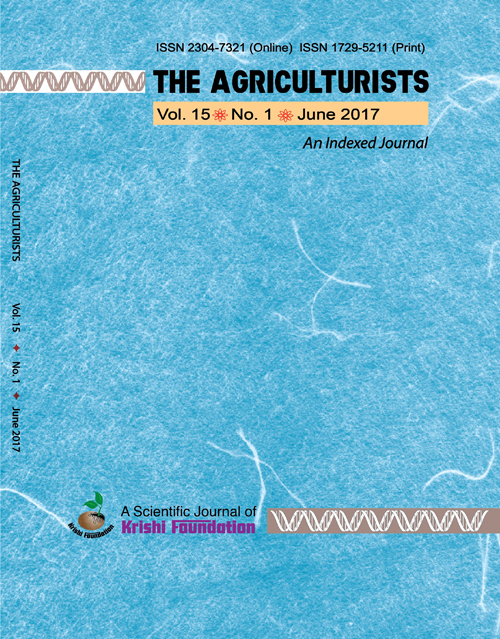Effect of Arbuscular Mycorrhizal Fungi on the Tolerance to Sodium Chloride Levels, and on Growth and Yield of Lentil (<i>Lens culinaris</i>)
DOI:
https://doi.org/10.3329/agric.v15i1.33439Keywords:
Mycorrhizal inoculation, germination, lentil, sodium chloride, yield.Abstract
A pot experiment was carried out in the nethouse of Soil Science Division, Bangladesh Agricultural Research Institute, Joydebpur, Gazipur during 2014-2015 through 2015-2016. The design of the experiment was factorial randomized completely block design with 4 replications. The objectives of the study were to evaluate the potential of Arbuscular mycorrhization (AM) on the germination, yield and yield attributes of lentil treated with different concentration of sodium chloride (NaCl). Five NaCl treatments (0, 1, 2, 3 and 4%) possessed NaCl level as the first factor that were treated with soils before sowing of lentil seeds overriding or pivotal pulse crop in Bangladesh. The second factor consists of mycorrhizal and non-mycorrhizal treatments. Mycorrhizal plants showed better performance in terms of germination %, yield and yield contributing characters than non-mycorrhizal plants. With increasing NaCl concentration germination %, yield and yield contributing characters in the rhizosphere soil, decreased significantly (p<0.01). Interaction effects of mycorrhizal inoculation and NaCl on germination %, growth and yield of lentil were appeared to be statistically non-significant. The highest germination (96.25% in 2014-2015 and 92.50% in 2015-2016), seed yield (6.45 g pot-1 in 2014-2015 and 5.89 g pot-1 in 2015-2016), and stover yield (9.55 g pot-1 in 2014-2015 and 8.58 g pot-1 in 2015-2016) was found in NaCl 0% + AM treatment. The lowest germination %, seed yield and stover yield was found in NaCl 4% treatment. Mycorrhizal inoculation increased seed yield on an average by 31.85% during 2014-2015 and 63.71% during 2015-2016, and increased stover yield on an average by 48.56% during 2014-2015 and 63.55% during 2015-2016 over non-mycorrhizal inoculation. Therefore, it can be concluded that mycorrhizal inoculation increases germination %, growth and yield of lentil over non-mycorrhizal inoculation.
The Agriculturists 2017; 15(1) 156-169Downloads
177
182

